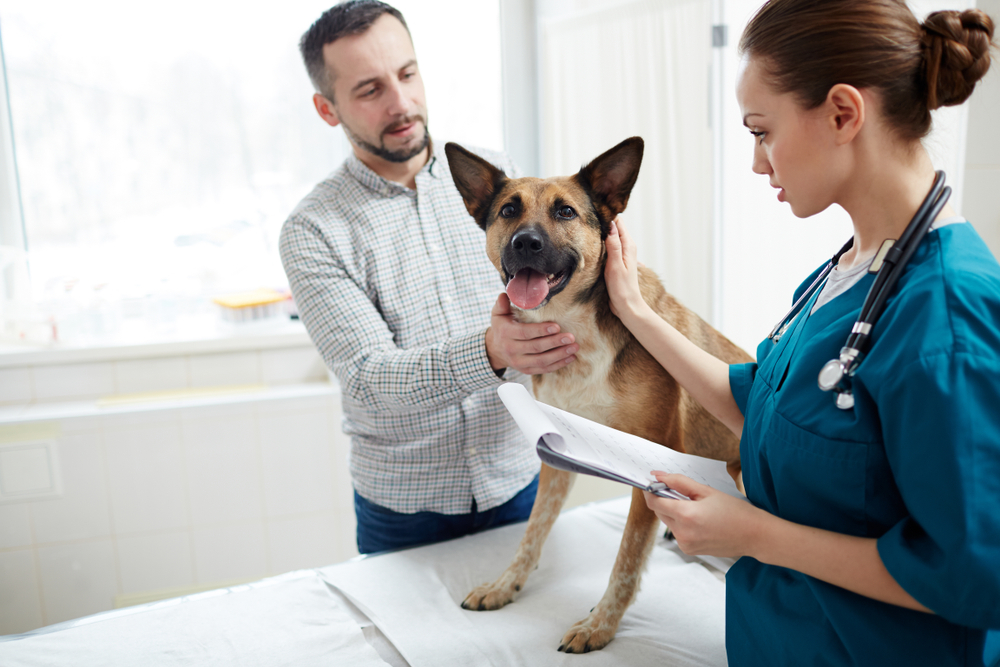Click to Skip Ahead
Anytime our dog’s bathroom habits change, it can be pretty scary! Especially if there is a change that could signal something is potentially wrong with their system. If your dog had black specks in their stool, it can be alarming for any pet parent! However, it could just be undigested food or it could be something such as blood in their stool.
Before even reading this article, we urge you to take a picture of the poop, and maybe even grab a sample of the poop and place it in a plastic Ziploc bag, as gross as it might sound. Keeping the visual might help your vet diagnose your pup. Plus, you can see if it happens again and take note of any changes.

When to See a Vet
If you notice any unusual behavior or you are concerned about your pet’s stool, it is important to get them to your vet promptly. Something might just be passing through their system that is undigested, but it could also trigger worry for a more serious health condition.
It’s best to get all of that out of the way and get them checked out so you can get your pup on the road to recovery one way or another.

What Could Black Specks in Dog Poop Mean?
If you’ve just noticed black specks in your dog’s poop, it’s definitely going to raise some red flags. Like any good dog owner, you want to make sure that your pup is getting the attention they deserve if something is wrong. So, what exactly are these black specks?
Undigested Food
There is a chance that the stool contains undigested food bits. They might have eaten something out of the garbage and gotten into something that is now showing up in the stool.
Inedible Undigested Bits
Is there a chance your dog chewed up a piece of plastic or got into something that was black in color? Or maybe it could be something such as plant matter, if your dog went outside and ingested something like a chewed up stick, or even dirt. Anything that your dog ate, whether it be inedible or hard for them to digest, might have passed right through their system, now being unrecognizable in a pile of poop.
Digested Blood In Stool
If there is blood present in the stool, it will likely be black in color if bleeding happens in the upper GI tract and has been digested. If blood is from the lower GI, such as the colon or anus, it will be bright red in color. If you’re seeing specks of black that are related to blood, it could be an issue with the esophagus, stomach, and any of the upper components.
It could even happen as a result of swallowing blood from a mouth injury. It might be alarming to see these black specks in your dog’s stool, but it is very important to contact your vet if you think there is blood in your dog’s stool.

Stool Color, Consistency, and Content are Important
If you are trying to decode all of the secret messages in your dog poop, it’s important to take several factors and considerations. You’re not just looking at the black specks, you’re looking at the whole package.
Is the poop an unusual color in addition to having black specks in it? Does it seem looser or firmer than normal? Taking note of any changes in addition to black specks can help your vet determine the possible cause.
Color
Color matters! It can tell us a lot about our pup’s health and well-being. So, what does each color mean?
| Brown: | Brown is the standard and expected color for dogs. |
| Red: |
Red signifies blood in the lower gastrointestinal tract. In rare cases, it may be contributed to the overconsumption of food dyes.
|
| Green: |
Green usually means that your dog either ate too much grass or veggies, but if persistent it can indicate health concerns such as a gall bladder issue.
|
| Orange/Yellow: |
Orange stools can be related to the diet as well but can also indicate health issues related to the liver.
|
| Gray: |
Gray and greasy poop may be an issue with the pancreas or biliary system.
|
| Black: |
Black tarry feces may mean bleeding from the upper gastrointestinal tract. Contact your vet straight away.
|
Consistency
The consistency of the poop can tell you a lot as well.
| Brittle, Firm, Pebbly: | A firm, dry stool indicates that your dog may be dehydrated and probably constipated. |
| Formed, log-shaped and moist: | Normal feces are compact and moist and hold their form when picked up. |
| Loose, soupy: | Looser, soggy piles of poop without form usually indicates diarrhea. |
| Liquid: | Liquid poop is classic of diarrhea and usually a cause for concern. It’s important to keep your pup hydrated during this time and contact your veterinarian for advice. |
Content
The content of your dog’s poop can also give you clues as to any problems.
| Mucus: | Slimy mucus or jelly like material is usually an indication of colitis (an inflamed colon). |
| Small White Bits: | These may be worms, contact your veterinarian for advice. |
| Hair: | If your dog has a skin problem and is excessively licking and grooming you may see hair in the stool. |

Conclusion
So now you understand that black specks are often not cause for concern. The worst-case scenario is that your dog has bleeding in the upper GI and the black specks are digested blood. If that’s the case, you will need to get to the bottom of it, so be sure to make that appointment as soon as possible.
Even if you are pretty sure your dog just ate something funky, it is best to seek medical help to ensure you’re doing the right thing.
Featured Image Credit: LightField Studios, Shutterstock











